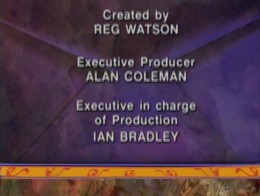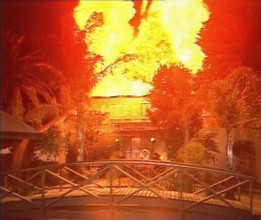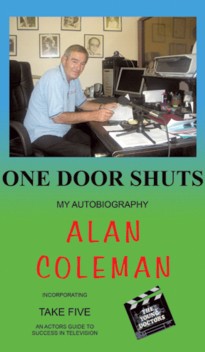|
.
Interviews
> Alan Coleman
As Executive Producer, Alan Coleman oversaw the destruction of the Waterhole & an overall change in pace as Neighbours moved on from the departures of several key characters and offered viewers one of it's most dramatic & daring seasons to date. The risk paid off as the show experienced somewhat of a renaissance in the UK in the ratings stakes. Here, he talks to us about his time on the show and his newly-published autobiography...
Can you give us a background on your career before Neighbours?
I have a fairly extensive background in the television industry. I was a director on the very first five nights a week, fast turnaround television series Crossroads in the UK. Before Neighbours, I was involved in many Grundy productions including Class of 74, Case for Defence and of course The Young Doctors. I was producer and director on the shows and also wrote many episodes of The Young Doctors.
You were involved in the show during it's time on Seven, writing several episodes in 1985. What are your memories of that time?
Very happy memories actually, a well balanced mixture of established actors and some very interesting and talented new young people - some very interesting storylines and cliffhangers.
You became more centrally involved with the series in the early 1990s moving from Director to Producer and then onto Senior Director. How did that come about initially? What did those roles entail?
I had left Grundys at that time and had formed my own production company. The organisation approached me and contracted me to direct a few blocks of episodes. During that time the producer left the series and I was appointed producer. The organisation wanted me to continue directing and was anxious to train new young directors in order to bring new blood into the program. The Senior Director title really meant nothing except that I was obviously the Senior Director in not only experience but also in advancing years!!!
|

|
Soon after you became Executive in charge of production and later Executive Producer, how did the jobs differ?
Basically the two titles reflect the same job. An Executive Producer is in total charge of the production, being very involved with major and weekly storylines, signing off the final scripts, the introduction of new characters and casting. And being responsible for ensuring that the production runs smoothly and is giving the network the program that they are paying for and on budget. An Executive Producer is usually employed by the Production Company.
An Executive in charge of production normally looks after more than one production. This title is usually given to a Network Executive who will be overseeing more than one drama production.
Which of your roles did you most enjoy?
I really enjoyed all the roles for which I was employed - writing, directing, producing and executive producing. They all presented me with different problems and very different ways of dealing with these problems. If I have to be very honest I think directing is the role that I enjoy most. This is because the director is dealing very closely with cast and crew. And to be given a script, which is merely words on paper and then bringing these words to life in performance and then seeing this performance being brought to life on the screen gives me an enormous sense of personal satisfaction.
Were there any areas you wanted to change about the show when you took on the role of Executive Producer?
One of the main things that I was concerned about when I was appointed Executive Producer was that the show was in danger of becoming stale. We felt that the show was becoming a 'talking heads' program. And talking head programs are a big no-no.
You took on the role at quite a difficult time for the show, it had bid farewell to a number of long standing characters departed, including Jim, Todd, Madge and Dorothy. How did you cope with the aftermath of these prolific departures, and do you think their exits effected the show?
Neighbours was always designed to be a reflection of life. And as in life, people come and people go. And people die and as in any normal neighbourhood new people bring new life to a street. Of course people don't like to see their favourite character leave the show, but what you have to do is to make sure that their departure doesn't affect the show. And you do this by introducing new and interesting characters - each with a new and different story to tell.
What plans did you put in place to move the show forward?
The first thing I did was to try and introduce more pace to the show. 'Talking heads' scenes were given the flick and we introduced much more movement - movement on the screen promotes more interest. When I was in charge of children's drama in England I very quickly realised that in order to maintain young interest in any show, you have to change the shot every four or so seconds. In adult drama you can in fact shoot a whole scene on one camera but there has to be a lot of movement both from the performers and the cameras in order to maintain interest.
|

|
You oversaw the destruction of the original Waterhole, was this to illustrate a visible change in the show?
A huge fire, a massive traffic accident, an aeroplane emergency or a bank hold up will always be responsible for good TV ratings. And ratings are our ultimate goal of course. And The Waterhole was fast becoming a 'been there - done that' location and a good cliffhanger and the inevitable facelift was like a breath of fresh air.
The pub reopened just in time for Neighbours' 2000th episode. How did you approach this milestone? How did the decision to centre the episode on Helen Daniels come about?
I'm afraid I can't really answer this question as during that time the Grundy drama people had contracted me to set up a new series called Unter Uns in Germany. As I was now in charge of more than one production, I was given the title of Executive in Charge of Production!!
Were there any characters that you particularly liked or were proud of introducing?
I'd like to think that I was proud of all the characters that I introduced to the show. Different characters always provide me with different problems as all characters have to be dealt with in a slightly different way. I would find it difficult to single out any particular characters as they all gave me what I felt was needed. I think the fact that the show is still being produced after all these years proves that the program is giving our viewers what they want.
Do you have any favourite storylines from your time with the show?
In a funny sort of way my favourite storylines would be the ones that I was dealing with at any one particular time during production. As with characters, different storylines presented different problems. Dealing with the storyline which led up to Jim Robinson's final moments in life was definitely a 'people's director's' proposition, whereas dealing with the storyline which involved Annalise Hartman and Gaby Willis being involved in a light aeroplane crash was more a case of coordinating stunt people, special effects departments and special camera work.
What did you most enjoy about working on Neighbours?
Going right back to my answer to one of the earlier questions, I think what I most enjoyed working on was the delightful mixture of the young and the old, the well established performers and the new raw talent. I always held both cast and crew of the show in high regard. I wanted the program to be successful. I really enjoyed my role in encouraging each and every member of the cast and crew to enjoy what they were doing. On any production I will always work my butt off to ensure that there is no 'them and us.' We all rely on each other to ensure that we all give of our best.
|

|
What have you worked on since leaving Neighbours?
Apart from much corporate work, I was with Shortland Street in New Zealand from the very beginning. I was Executive Producer and director of the show and also wrote episodes. I wrote and directed episodes of The Adventures of the Bush Patrol - a children's drama series shot in Western Australia. I also directed Above the Law, Going Home and TwentyfourSeven for McElroy television. I was also involved in drama productions in the Netherlands, Germany and England. I won't bore you with the rest; details are in the book which I have just written!!
Do you ever watch the show now? If so, what do you think of it?
Unfortunately I very rarely get the chance to see the show these days. I have my acting school which means that I am always teaching late afternoon, early evening.
What would you say are the strengths and weaknesses of the Neighbours format?
I can only comment on my feelings during the time I was concerned with the production. I think its strength was that we went out of our way to make sure we were giving our viewers what they wanted. Births, marriages, deaths and gossip!! Interesting characters with interesting stories to tell. On the downside, one of the main weaknesses the program did suffer was its tendency to become a talking heads show. And we soon dealt with that.
Having worked on other dramas in both Australia & the UK, how does Neighbours compare? Is there a standard to maintain - perhaps even to beat - when comparing it with other similar shows? What is its mission statement and place in the television market?
In any production there is always a standard to maintain. You rapidly go downhill and get axed if you don't maintain that standard. And of course it's very satisfying to try and better that standard and beat similar productions. Neighbours compares very favourably in standards in all areas with shows I have worked on in many countries across the world. Neighbours mission statement is that it is a show about people. Their stories, their loves and lives, their highs and their lows. There will always be a place in the television market for this type of program. I was fortunate enough to be around during the introduction, both here and in the UK of this fascinating world of Fast Turnaround -- Five Nights a Week television production. I would like to think that there is still a place for me in that world.
Your autobiography, One Door Shuts, has recently been published in which you 'lift the lid' on the serial dramas you've been associated with. Can you tell us a little bit about it?
I think that our viewers are always interested in anecdotes and stories about what goes on behind the scenes. They like to read about how the shows are produced and the stories behind the stories. One of the questions I am constantly asked is "What was so and so like to work with?" and "what was it like working on such and such show." I think One Door Shuts answers these and many other questions.
|

|
It also includes a standalone section, Take Five, based on the training workshops you ran on the set of Neighbours. What & who did these involve?
There are many stage schools across the world. But very few of them teach the special skills and disciplines needed in order to work for the film and television camera. The more I got involved with fast turnaround television production, using many new people straight from stage school, the more I realised that our limited rehearsal time was taken up with me teaching people the basic skills for television. I formulated my workshops, Take Five, in order to address this problem. I ran these training workshops on Neighbours, Shortland Street and in fact on most of the shows I worked on. Although mainly conducted for the young and new talent I was very impressed that all members of the cast attended the workshops and agreed that there was much to learn. In fact we never stop learning. These workshops now form the basis of my TV Drama School that operates across the Central Coast here in Australia.
Incorporated in One Door Shuts is the workshop book, Take Five, which I trust will be of tremendous use to new and young actors, but will also make an interesting read as it also contains anecdotes and stories with regard to many of the productions I have worked on.
As it approaches its 25th Anniversary, what do you think has made Neighbours so successful?
In a nutshell I think my basic answer to that question is that Neighbours is providing entertainment that people want. Stories and characters that our viewers can identify with. And with neighbours, some of whom we would like and some of whom we would rather not have living next door to us.
Alan Coleman's autobiography, One Door Shuts, has been published by Trafford Publishing and can be ordered here.
Interview
by Callum. Added on 2nd January 2010
Back
|

